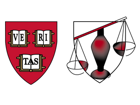Posts filed under 'David Weinberger'
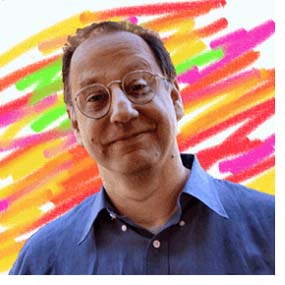 David Weinberger
David Weinberger
Everything is Miscellaneous
Wired News/Berkman Center Podcast Series
by Dylan Tweney:
“Neil DeGrasse Tyson is an astrophysicist who doesn’t believe in planets. Of course he knows that there are large objects circling the Sun. He just doesn’t believe that picking out nine of them — or eight, now that Pluto has been demoted — has any scientific basis. There are far more interesting ways of dividing up the universe. For example, there are four bodies in our solar system that have atmospheres — three planets and one moon of Saturn — and having an atmosphere is far more interesting scientifically than simply being a big object because having an atmosphere raises lots of questions and possibilties. Being big raises nothing but the question, ‘Well, so how exactly big are you, anyway?’
David Weinberger, author of Everything is Miscellaneous, recently talked with Dr. Tyson about why we humans have insisted on acting as if there’s only one way to slice up a universe that is far more miscellaneous than that.
This podcast interview is the fourth in a series sponsored by Wired News and the Harvard Berkman Center for Internet & Society.”
 Download the audio MP3 file.
Download the audio MP3 file.
- Subscribe to the RSS feed for this series.
May 23rd, 2007
 David Weinberger
David Weinberger
Everything is Miscellaneous
Wired News/Berkman Center Podcast Series
This is the Future of the News:
The Arianna Huffington Interview
by Dylan Tweney
“The Huffington Post is an incredible Web success story. In two years it’s become a site with enormous traffic based upon the richness of its content. Is HuffingtonPost.com the future of news media? It’s partisan, of course, but in many countries — and even many American cities — newspapers overtly take sides. More important from the point of view of the miscellaneous, the Huffington Post has an abundance of bloggers and commentators, representing a wide range of progressive interests, who provide an infrastructure of ideas, facts and opinions that adds context to any story.
In this audio podcast (the third in a series sponsored by Wired News and the Harvard Berkman Center for Internet & Society) David Weinberger talks with Arianna Huffington about her site and how bloggers are reorganizing and reinventing the news.”
 Download the audio MP3 file.
Download the audio MP3 file.
- Subscribe to the RSS feed for this series.
May 16th, 2007
 David Weinberger
David Weinberger
Everything is Miscellaneous
Wired News/Berkman Center Podcast Series
Controlled Chaos: An Interview with Kos
by Dylan Tweney
“Markos Moulitsas Zúniga — better known as Kos — didn’t know what he was letting himself in for when he decided to let readers blog on his site. Now that site, the DailyKos, is one of the top sites on the Web, to a large degree because Kos let a new form of communication emerge from the bottom up.
The DailyKos is a mass site. It has hundreds of bloggers on it and hundreds of thousands of readers. According to the old mindset, at a mass site, only a few people get to speak. Otherwise, chaos ensues. But not at DailyKos, where anyone who wants to can speak, and if enough readers like what she’s saying, her voice can be heard from the front page. DailyKos thus manages to be both mass and intimate at the same time.
In this audio podcast (the second in a series sponsored by Wired News and the Harvard Berkman Center for Internet & Society) David Weinberger talks with Kos about how he arrived at this solution and whether there’s something inherently political about it.”
 Download the audio MP3 file.
Download the audio MP3 file.
- Subscribe to the RSS feed for this series.
May 9th, 2007
 David Weinberger
David Weinberger
Everything is Miscellaneous
Wired News/Berkman Center Podcast Series
Metacrap and Flickr Tags: An Interview with Cory Doctorow
by Dylan Tweeney
“Welcome to the first in a series of interviews conducted by David Weinberger, author of the new book Everything Is Miscellaneous.
In this series, which is cosponsored by Wired News and the Harvard Berkman Center for the Internet and Society, David talks with some of the leading businesspeople, scientists, and thinkers who are coming up with innovative new ways of putting ideas, information and knowledge together. Now that the digital age has blown apart traditional ways of organizing information, what’s next? Suddenly, everything is miscellaneous.
David kicks off the series by interviewing novelist, BoingBoing co-editor, digital rights activist and entrepreneur Cory Doctorow. For Cory, piling up information without strict organizational rules can be workable provided that we have sufficiently reliable metadata. The problem is that people don’t all use metadata the same way or use tags consistently, and that can be a real obstacle to making coherent sense of piles of information.
David and Cory discuss the advantages and pitfalls of explicit and implicit metadata, tags and the rules governing the use and re-use of content in commerce and culture.
In future podcasts, David will talk with political blogger Arianna Huffington, Craigslist founder Craig Newmark, astrophysicist Neil deGrasse Tyson, Kayak founder Paul English, BBC Richard Sambrook, and Markos Moulitsas Zuniga. Bookmark Epicenter’s podcast category and come back next week for the next interview!”
(Photo above by Jason Kottke)
 Download the audio MP3 file.
Download the audio MP3 file.
- Subscribe to the RSS feed for this series.
May 3rd, 2007
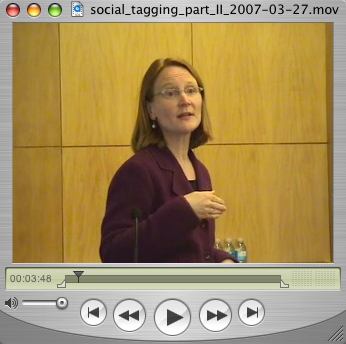
Click To Play Video
Harvard University Libraries hosted a forum this week, “Social Tagging @ Harvard: A Del.ici.ous Alternative or Passing Flickr?,” that looked at the online practice of tagging and sought to weigh the separate techniques to determine the best method of taxonomy.
Participants include:
- David Weinberger, Berkman Center for Internet and Society fellow, will talk about the significance of Web 2.0, social bookmarking and tagging technologies.
- Michael Hemment, research librarian and head of scholarly research initiatives at Widener Library, will demonstrate social bookmarking in action, examine the PENNTags project, and discuss implications for scholarly research and libraries.
- Carla Lillvik (pictured above), research and distance services librarian at Gutman Library, will examine tagging and social tagging within the context of other bibliographic management solutions available to Harvard researchers, like RefWorks, EndNote, and the My Research tool in E-Research @ Harvard Libraries.
- Adam Seldow, graduate student in the Harvard Graduate School of Education, will discuss his Edtags initiative, recipient of a Provost Innovation Fund grant.
For more about this event, visit “Tagging in Real Space“.
Video produced by Colin Rhinesmith.
Runtime: 1:00:47, size: 320×240, 168mb, QuickTime .MOV, H.264 codec
March 30th, 2007
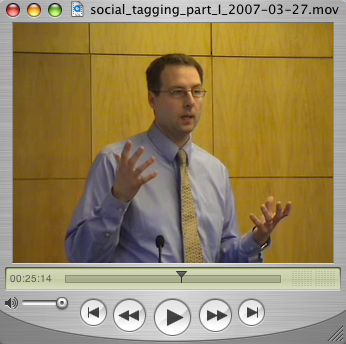
Click To Play Video
Harvard University Libraries hosted a forum this week, “Social Tagging @ Harvard: A Del.ici.ous Alternative or Passing Flickr?,” that looked at the online practice of tagging and sought to weigh the separate techniques to determine the best method of taxonomy.
Participants include:
- David Weinberger, Berkman Center for Internet and Society fellow, will talk about the significance of Web 2.0, social bookmarking and tagging technologies.
- Michael Hemment (pictured above), research librarian and head of scholarly research initiatives at Widener Library, will demonstrate social bookmarking in action, examine the PENNTags project, and discuss implications for scholarly research and libraries.
- Carla Lillvik, research and distance services librarian at Gutman Library, will examine tagging and social tagging within the context of other bibliographic management solutions available to Harvard researchers, like RefWorks, EndNote, and the My Research tool in E-Research @ Harvard Libraries.
- Adam Seldow, graduate student in the Harvard Graduate School of Education, will discuss his Edtags initiative, recipient of a Provost Innovation Fund grant.
For more about this event, visit “Tagging in Real Space“.
Video produced by Colin Rhinesmith.
Runtime: 46:55, size: 320×240, 125mb, QuickTime .MOV, H.264 codec
March 30th, 2007
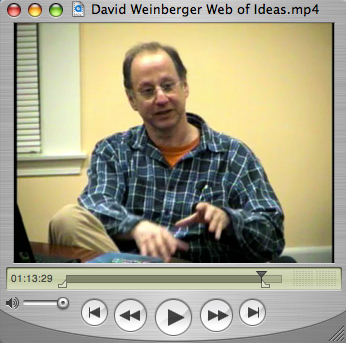
Click To Play Video
Web of Ideas with David Weinberger, March 21, 2007.
Thanks to the pliability of bits and the connectedness of the Net, we’re now able to participate in our culture like never before. We can create a video and post it at sites like YouTube. We can watch a video and comment on it, tag it, link to it, mash it up with another video. We can build massive encyclopedias together. We can form clans to play games. We can build an island in SecondLife where we can interact in a world we’ve created together. But, is this burst of participation in culture leading to greater participation in politics and democracy? If so, what are the connecting points?
This video features David Weinberger leading a Web of Ideas discussion at the Berkman Center to explore these and other questions.
Runtime: 1:20:56, size: 320×240, 225mb, QuickTime .MP4, H.264 codec
March 28th, 2007
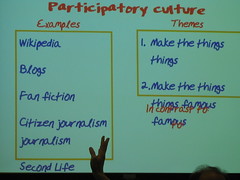
Web of Ideas with David Weinberger, March 21, 2007.
 Download the audio podcast (time: 1:20:56).
Download the audio podcast (time: 1:20:56).
Thanks to the pliability of bits and the connectedness of the Net, we’re now able to participate in our culture like never before. We can create a video and post it at sites like YouTube. We can watch a video and comment on it, tag it, link to it, mash it up with another video. We can build massive encyclopedias together. We can form clans to play games. We can build an island in SecondLife where we can interact in a world we’ve created together. But, is this burst of participation in culture leading to greater participation in politics and democracy? If so, what are the connecting points?
On this edition of AudioBerkman, we’ll hear David Weinberger leading a Web of Ideas discussion at the Berkman Center to explore these and other questions.
March 26th, 2007
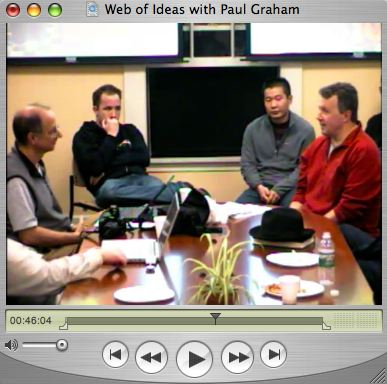
Click To Play Video
Berkman Fellow David Weinberger interviews Paul Graham, software guru, entrepreneur, essayist and painter.
In a recent essay, “Taste for Makers,” Paul argues that successful design, from math to software to painting, relies on the same aesthetic principles. Taste is therefore not a matter of subjectively appreciating fine works but is a required capability for creating great software. But is taste as timeless as Paul suggests? Do the design principles Paul points to result from aesthetic or functional characteristics? And why should we think that the visual and the programmatic, the artistic and the functional, the physical and the virtual might all be beautiful in similar ways?
Produced by Indigo Tabor and Colin Rhinesmith.
November 9th, 2006
 Berkman Fellow David Weinberger interviews Paul Graham, software guru, entrepreneur, essayist and painter.
Berkman Fellow David Weinberger interviews Paul Graham, software guru, entrepreneur, essayist and painter.
In a recent essay, “Taste for Makers,” Paul argues that successful design, from math to software to painting, relies on the same aesthetic principles. Taste is therefore not a matter of subjectively appreciating fine works but is a required capability for creating great software. But is taste as timeless as Paul suggests? Do the design principles Paul points to result from aesthetic or functional characteristics? And why should we think that the visual and the programmatic, the artistic and the functional, the physical and the virtual might all be beautiful in similar ways?
 Download the MP3 (time: 1:19:07).
Download the MP3 (time: 1:19:07).
Produced by Indigo Tabor and Colin Rhinesmith.
November 9th, 2006
Next Posts
Previous Posts
 David Weinberger
David Weinberger Download the audio MP3 file.
Download the audio MP3 file.




 Berkman Fellow
Berkman Fellow 